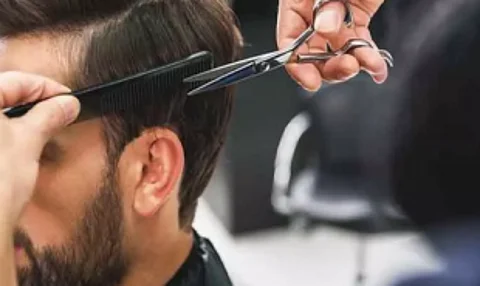

When I heard my grandson asking for money to get his hair cut at a salon, I remembered my childhood days in my village when Kittu, the barber, used to come to our home to offer his services. He knew when the turn of each house came and would present himself there on time. As my elder brother and I had to attend school, he would come to our house only on Sundays. Though our father also got his hair cut and face shaved, the children were allowed to be served first. We would sit on a wooden stool under the sprawling tamarind tree by the side of the house for Kittu to start his work.
He would untie his small khaki bag containing his tools of the trade: a couple of combs, a pair of scissors, a folding razor, a whetting stone, a brass bowl, a piece of soap and a piece of alum. He had standing instruction from our father that our hair should be cut short. We had no say in the matter.
After cutting our father’s hair, Kittu would fill the bowl with water and get a piece of soap from the house for rubbing it on his face till lather was formed. After shaving, he would rub the piece of alum on his face for cauterising nicks. At the end of his work, he would be offered a glass of hot black coffee. Once the cutting was over, the three of us would go to the nearby Pamba river to take bath.
As he visited most of the houses in the village, Kittu was a storehouse of news about the goings-on in the village. People respected him for his discretion and for not indulging in gossip. They treated him as the provider of an essential service at home.
Kittu was not paid in cash for his services. He was given a part of paddy after every harvest. As he got paddy from every rich farmer, there was enough left for sale, which would be more than sufficient for meeting the other needs of his family. He also got coconuts, other agricultural products, and firewood from his clients. He was also given gifts during social functions like weddings.
By the time I left my village for higher studies, Kittu had lost the monopoly of his trade in the village in the form of a barbershop near the marketplace. It was run by someone from outside the village. The owner had an assistant who would cut the hair of children and shave the face of older customers. The service of the owner was reserved for more important customers. The shop had a ceiling fan, large looking-glasses before and behind the two high wooden chairs with an adjustable attachment for shaving. The customer, his upper body covered with a cotton sheet, could monitor the progress of the haircut by looking at the mirrors and giving necessary instructions. There were photographs of models with different hairstyles on the wall. The customers could choose any of the styles. The shop had a newspaper and a magazine in Malayalam with several back editions for customers to read while waiting for their turn.